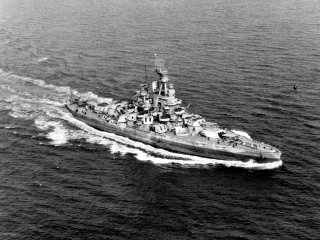America's USS Nevada Battleship Survived Pearl Harbor And Never Stopped Fighting
Built just before America’s entry into World War I, the Nevada was the lead ship in her class and a modern marvel at the time of her construction.
Here's What You Need To Remember: While largely forgotten to history, the USS Nevada represents the stubbornness and resilience of the American fighter; a symbol of how the U.S. has always risen from the ashes of tragedy and triumphed over her enemies.
Two attributes often come to mind when attempting to describe the American mindset: stubbornness and perseverance.
If ever there was a physical embodiment of those qualities it would be the USS Nevada. A battleship that rose from her watery grave after the attack on Pearl Harbor to exact vengeance upon the Axis powers and refused to go down until the bitter end.
Built just before America’s entry into World War I, the Nevada was the lead ship in her class and a modern marvel at the time of her construction.
Sporting four main triple-gun turrets, an “all or nothing” armor scheme, and a then-modern oil-fired propulsion system, the Nevada would set the standard for American battleships.
Missing her chance to serve on the frontlines of the Atlantic due to a fuel oil shortage in Great Britain, the Nevada instead set off for Ireland. After some time, she made port in France to escort then-President Woodrow Wilson. Despite serving with dignity, she never got a chance to fire a shot in anger.
Upgraded between the two World Wars, the Nevada was a stubborn old girl by the time the calendar flipped to December 7, 1941. On a day that will live in infamy, the Nevada was not docked near the other battleships along Ford Island and managed to maneuver away from the majority of the Japanese attacks.
Despite shooting down four planes, the Nevada was hit by a torpedo from a Japanese “Kate” bomber and took on water. With an expert crew managing damage control, the Nevada was limping away when she was targeted by “Val” bombers from the second Japanese wave.
Intending to sink her and use her to block the channel, the Japanese pilots managed to drop five bombs on the Nevada, but failed to bring her down. Refusing to die, the Nevada was able to escape to the west side of Ford Island, beached herself, and sank deeper into the waterline. By the time she was evacuated, sixty of her crew were dead and 109 were wounded.
A few months later, the stricken Nevada would rise from the waters, undergoing temporary patches at Pearl Harbor before she got a more extensive upgrade in Washington state.
Revived, modernized, and thirsting for blood, the Nevada set out to the Alaskan coast where she participated in the week-long operation to capture Attu Island from the Japanese. That battle was the only conflict where ground warfare occurred on American soil during World War II.
Having made her first salvos of the war, the Nevada was sent to Virginia to be refitted before heading off to the Atlantic. She was assigned to protect Allied convoys from German vessels.
After completing several runs, the Nevada was tapped to participate in the Invasion of Europe, namely the amphibious landings at the beaches of Normandy, France.
During the operation (better known as D-Day), the Nevada gained notoriety for helping save the day with some incredibly accurate fire. The off-shore battleship often engaged enemies as far as twenty miles inland. Praised by ground troops the Nevada moved on to participate in Operation Dragoon off the coast of Toulon.
Following her service in Europe, the warship headed to Asia, where she provided fire support for the invasion of Okinawa, which was America’s foray into the Japanese homeland.
During the assault, she was struck by a Japanese Kamikaze, but refused to go under at the hands of the Axis.
After the war, the Nevada was deemed too old for service and slated for use as a target for the Bikini Atoll nuclear experiments. Despite being nuked twice, the Nevada refused to die.
Finally, after a bombardment from the battleship Iowa, fire from two other vessels, and an aerial torpedo from a passing plane, the Nevada finally decided it was time to go and sunk beneath the waves approximately 70 miles southwest of the place where she first came under attack.
While largely forgotten to history, the USS Nevada represents the stubbornness and resilience of the American fighter; a symbol of how the U.S. has always risen from the ashes of tragedy and triumphed over her enemies.
The USS Nevada in many ways is a lost symbol of the United States, and as such, should not be forgotten.
This first appeared in WarIsBoring here.
Image: Wikipedia.

